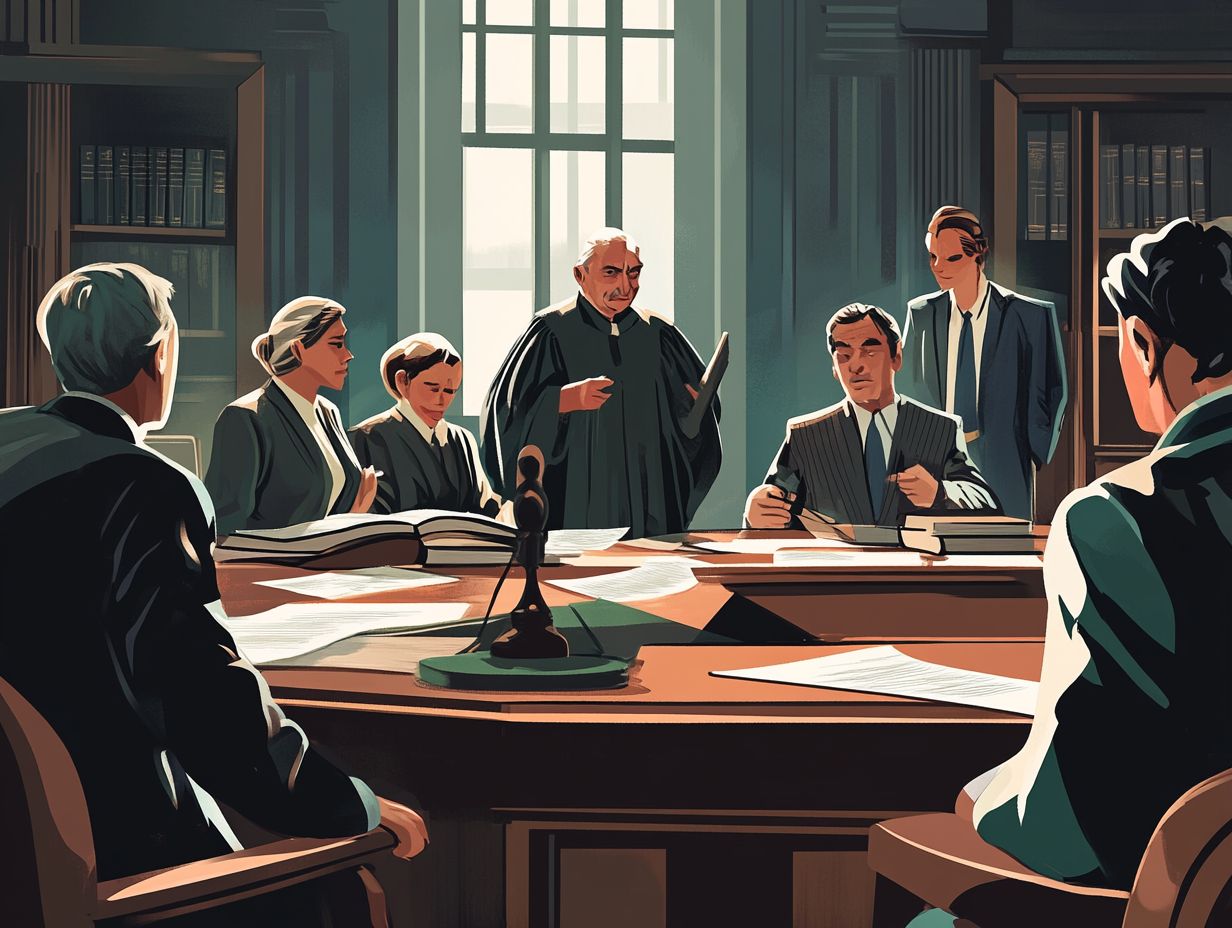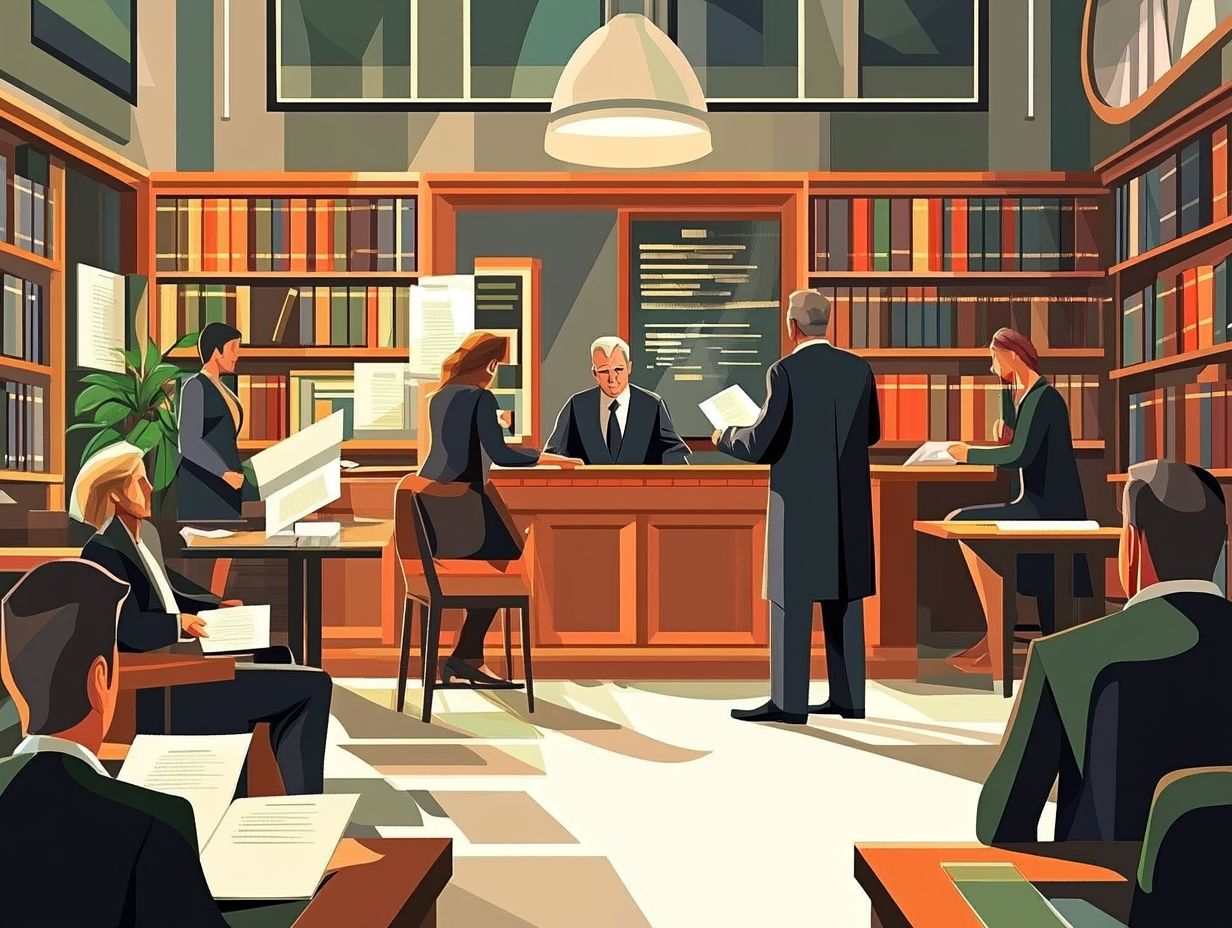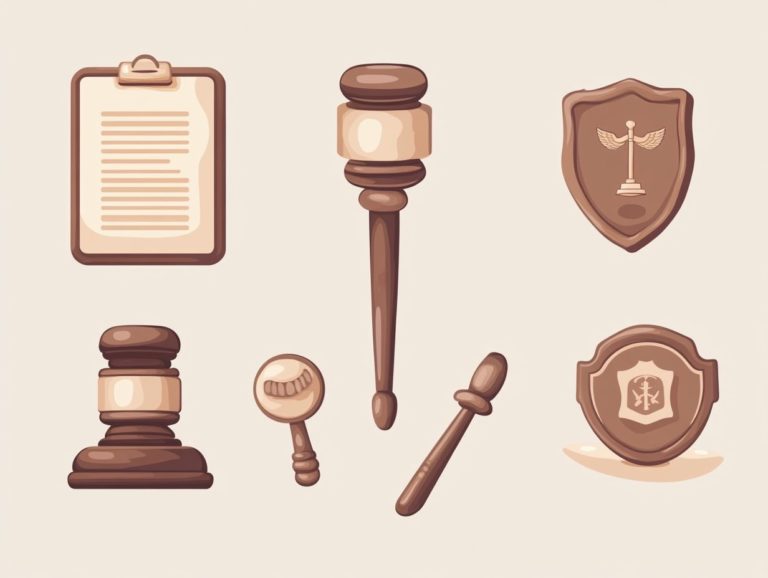The Role of Settlement in IP Litigation
Intellectual property litigation can be complex and costly for businesses and individuals. Settling disputes outside of court often proves to be a more pragmatic solution.
This article explores the advantages of settlement in IP cases, focusing on cost-effectiveness and risk management. You ll gain insights on key negotiation factors and guidance on creating fair and enforceable agreements.
Join us as you navigate the intricacies of intellectual property settlements. Discover their pivotal role in effective dispute resolution!
Contents
Key Takeaways:

Settlement in IP litigation saves time and money for both parties.
Negotiations should consider the strength of evidence and the importance of legal counsel.
Challenges include ensuring terms are fair and avoiding future disputes.
Overview of Intellectual Property Litigation
Intellectual property litigation involves legal disputes over the infringement of rights like patents, copyrights, and trademarks. Protecting these rights is crucial for fostering creativity and innovation in various industries.
Trade secrets and design rights are also at risk of infringement. This highlights the stakes involved in business.
Common enforcement measures include cease-and-desist letters and temporary restraining orders, which can halt infringing activities.
Resolutions can range from monetary damages to licensing agreements, often reshaping market dynamics.
Engaging with industry associations provides support through advocacy and education. Staying informed about your intellectual property rights is essential!
Benefits of Settlement in IP Cases
Settling IP cases through arbitration and mediation offers numerous advantages over traditional litigation. These methods save you time and money.
With settlement agreements, you can reach a binding decision quickly. This avoids the complexities of lengthy judicial processes.
Effective negotiation strategies help maintain business relationships, which can suffer during litigation. This approach minimizes potential antitrust issues in IP disputes, allowing for smoother navigation.
Cost-Effectiveness and Time-Saving

The primary benefit of settlement agreements in IP disputes is their cost-effectiveness and time savings. They offer a more efficient alternative to traditional litigation, especially when considering the role of the USPTO in IP litigation.
Avoiding lengthy trials allows you to focus on your core business operations. Redirect your resources toward what truly matters.
This strategy minimizes direct costs like legal fees while alleviating indirect costs related to lost productivity. Lingering disputes can distract management and employees, hindering overall performance.
Alternative dispute resolution methods expedite the process. This efficiency helps you focus on innovation and growth, rather than getting bogged down in legal battles.
Reducing Risks and Protecting Confidentiality
Settling IP disputes helps you reduce risks, including the chance of exposing sensitive information, which is a common concern during IP litigation.
By negotiating settlement agreements, you can establish rules that stop anyone from sharing your proprietary information. These agreements typically include clauses that prevent either party from disclosing the settlement details or the underlying dispute, ensuring that sensitive intellectual property remains protected from competitors and the public.
By embedding specific safeguards in the settlement, you maintain control over your innovations and trade secrets, creating a more secure environment for your ongoing business operations.
Prioritizing protective measures allows you to confidently protect your ideas and focus on what you do best!
Factors to Consider in Settlement Negotiations
When engaging in settlement negotiations for IP disputes, consider several crucial factors to secure a favorable outcome.
The strength of your evidence is vital, as it significantly impacts your leverage in discussions. Hiring a good lawyer is crucial; they will guide you through the intricacies of intellectual property law and help you understand the potential outcomes of different negotiation strategies.
Strength of Evidence and Potential Outcomes

The strength of the evidence you present plays a crucial role in shaping the potential outcomes of IP disputes. It influences not only your chances of success in court but also the dynamics of settlement negotiations.
Evaluate your evidence carefully to understand how it impacts your position and the likelihood of reaching a favorable settlement. Strong evidence can be a powerful negotiating tool, highlighting the merits of your claims.
For example, if you provide well-documented proof of patent infringement, the opposing party may offer a higher settlement to avoid a costly trial. Conversely, weak evidence could result in lower offers, as the perceived risk of an unfavorable judgment looms large.
In copyright disputes, undeniable proof of originality can drive a quick resolution, securing favorable terms for you and minimizing litigation expenses.
Importance of Legal Counsel and Mediation
Skilled legal counsel is essential when navigating the complexities of IP disputes, especially if you re considering mediation as a viable alternative to litigation.
Legal experts can guide you through the mediation process, ensuring your negotiation strategies effectively lead to a mutually beneficial agreement. They bring extensive knowledge of intellectual property law and experience in conflict resolution both critical for achieving a satisfactory outcome.
By assessing the unique dynamics of your case, your legal counsel can tailor their advice to reflect the intricacies involved, fostering a collaborative atmosphere during mediation.
They help you articulate your positions clearly, balancing assertiveness with flexibility, which can significantly enhance your chances of amicably settling disputes.
Ultimately, effective legal representation in mediation leads to efficient resolution processes and helps preserve ongoing business relationships, making legal counsel an invaluable asset in your IP disputes.
Challenges and Pitfalls in Settlement Agreements
Settlement agreements offer an efficient avenue for resolving IP disputes, but they come with unique challenges and pitfalls that you must navigate with care, especially considering the role of technology in modern IP litigation.
Ensure that the terms of the settlement are clear and form an enforceable contract. Ambiguous language can lead to future disputes over interpretation and compliance, complicating what should be a straightforward resolution.
Ensuring Fair and Enforceable Terms

To create a successful settlement agreement, ensure that all terms are fair and constitute a valid agreement. This involves careful drafting to avoid vague language.
Clearly outline the rights and obligations of each party to minimize the risk of future disputes. Employ precise terminology and steer clear of ambiguous phrases that could lead to differing interpretations.
For example, using terms like “reasonable efforts” can create confusion. Specify what those efforts entail instead.
Best practices include:
- Collaborating with legal professionals who specialize in settlement agreements to review the language and structure.
- Mitigating common pitfalls by including comprehensive clauses that detail how unforeseen issues will be managed.
By focusing on clarity and equity, you can ensure that your agreements are both fair and binding.
Avoiding Future Disputes
One of your key objectives in crafting a well-structured settlement agreement is to sidestep future disputes over intellectual property rights and obligations.
Clearly define enforcement measures and the consequences of non-compliance. This significantly diminishes the chances of misunderstandings and conflicts arising later on.
Establish not just clear guidelines for implementation, but also a systematic process for addressing potential breaches. Incorporate specific timelines for compliance and detail the steps to take in the event of a violation.
Incorporating provisions for mediation or arbitration can deter future conflicts, fostering a more collaborative atmosphere. Recognizing the importance of these elements nurtures a more harmonious relationship and enhances trust.
Summary of Benefits and Considerations
Settlement agreements in IP disputes offer powerful benefits! They resolve conflicts efficiently while considering various crucial factors, including the role of the internet in IP litigation.
Carefully consider the terms to ensure they are fair, clear, and enforceable, paving the way for successful resolutions. Effective negotiation is key in this process.
Enable both sides to express their needs and expectations, fostering a collaborative environment. Prioritize open communication to increase the likelihood of reaching a mutually acceptable outcome.
Paying attention to detail when drafting these agreements can help prevent future misunderstandings and disputes. This underscores the importance of seeking legal counsel to craft terms that truly serve your interests.
All these elements significantly contribute to a resolution that is not just satisfactory but also sustainable in the long run.
Frequently Asked Questions
- What is the role of settlement in IP litigation? Settlement plays a significant role in IP litigation as it allows parties to avoid the costs and risks associated with a lengthy trial and reach a mutually beneficial agreement.
- How does settlement benefit both parties in IP litigation? Settlement can benefit both parties by providing a quicker resolution, preserving business relationships, and reducing the financial burden of litigation.
- Can settlement be used in all types of IP cases? Yes, settlement can be used in all types of IP cases, including patents, trademarks, copyrights, and trade secrets.
- How is settlement typically initiated in IP litigation? Settlement can be initiated by either party through informal discussions, mediation, or through court-mandated settlement conferences.
- What factors should be considered when deciding whether to settle in IP litigation? When considering settlement in IP litigation, parties should evaluate the strength of their case, the potential outcome of a trial, and the costs and resources involved in continuing litigation.
- Is settlement legally binding in IP litigation? Yes, settlement agreements in IP litigation are legally binding and can include terms such as licensing agreements, payment of damages, and confidentiality agreements. It is crucial to carefully review and negotiate the terms of a settlement before signing.
Contact us today for expert legal advice and assistance in drafting effective settlement agreements!






